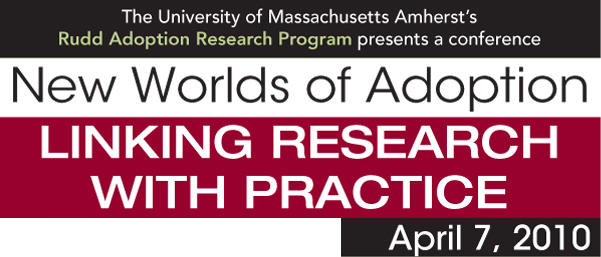Event Title
Openness in adoption and adoptive identity formation: The mediating role of family conversations
Location
University of Massachusetts at Amherst
Start Date
7-4-2010 4:00 PM
End Date
7-4-2010 5:30 PM
Description
Adolescence is a seminal period when young people explore goals, values, and beliefs in order to develop a coherent sense of identity. Adoption professionals and researchers are divided about how adoptive parents can best facilitate adoptive identity formation. Some claim contact with one or more birth relatives is critical while others suggest it is not. Despite divergent claims, there is little research on processes involved in adoptive identity formation. This study uses structural equation modelling to examine the role contact and conversation play in narrative adoptive identity formation. The notion that conversation plays a role in facilitating identity formation is consistent with narrative theory. Specifically, the model tested whether conversation about adoption taking place between adoptees and their adoptive parents mediates the association between contact with birth relatives and adoptive identity formation. Data were collected from 184 adoptive families as part of the Minnesota-Texas Adoption Research Project. Participants included adoptive mothers, adoptive fathers, and adoptees (M = 16 years). Evidence suggests that contact with birth relatives is significantly associated with adoptive identity formation and that this association is mediated by conversation about adoption taking place within the adoptive family. Higher levels of conversation about adoption are more likely to occur when adoptive and birth family members are engaging in higher levels of contact. Adoption professionals may be helpful in providing support and training activities that focus on adoption-related social interactions, such as contact with birth relatives. Future research should examine other processes adoptive parents use to integrate adoption-related social interactions into the warp and weave of family life.
Openness in adoption and adoptive identity formation: The mediating role of family conversations
University of Massachusetts at Amherst
Adolescence is a seminal period when young people explore goals, values, and beliefs in order to develop a coherent sense of identity. Adoption professionals and researchers are divided about how adoptive parents can best facilitate adoptive identity formation. Some claim contact with one or more birth relatives is critical while others suggest it is not. Despite divergent claims, there is little research on processes involved in adoptive identity formation. This study uses structural equation modelling to examine the role contact and conversation play in narrative adoptive identity formation. The notion that conversation plays a role in facilitating identity formation is consistent with narrative theory. Specifically, the model tested whether conversation about adoption taking place between adoptees and their adoptive parents mediates the association between contact with birth relatives and adoptive identity formation. Data were collected from 184 adoptive families as part of the Minnesota-Texas Adoption Research Project. Participants included adoptive mothers, adoptive fathers, and adoptees (M = 16 years). Evidence suggests that contact with birth relatives is significantly associated with adoptive identity formation and that this association is mediated by conversation about adoption taking place within the adoptive family. Higher levels of conversation about adoption are more likely to occur when adoptive and birth family members are engaging in higher levels of contact. Adoption professionals may be helpful in providing support and training activities that focus on adoption-related social interactions, such as contact with birth relatives. Future research should examine other processes adoptive parents use to integrate adoption-related social interactions into the warp and weave of family life.
